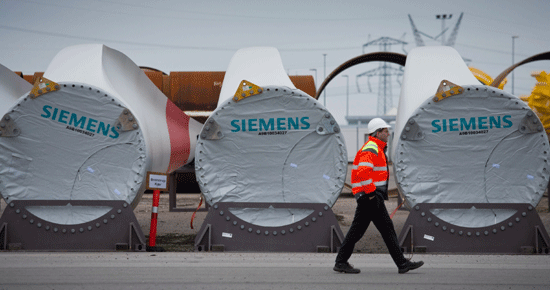Business confidence in Germany rises in Nov
Updated: 2011-11-25 07:30
(China Daily)
|
|||||||||
|
|
But country's economy shows signs of cooling as growth rate slows
LONDON - German business confidence rose for the first time in five months in November, defying Europe's worsening debt crisis.
The Munich-based Ifo Institute's business climate index, based on a survey of 7,000 executives, increased to 106.6 from 106.4 in October. Economists expected a decline to 105.2, according to a Bloomberg News survey.
"Germany is actually in a strong position and the order books are still full," said Carsten Brzeski, an economist at ING Group in Brussels. "As long as the labor market and domestic spending hold up, we're only looking at a soft patch, not a full-blown recession."
The German economy, Europe's largest, is showing signs of cooling as the escalating debt crisis damps demand for its goods across the 17-nation eurozone. While German unemployment remains near a two-decade low, supporting consumer spending, the Bundesbank this week slashed its growth forecast for 2012 to between 0.5 percent and 1 percent from 1.8 percent.
The European Commission on Nov 10 cut its eurozone growth forecast for next year to 0.5 percent from 1.8 percent, citing the debt crisis. In Germany, growth may slow to 0.8 percent in 2012 from 2.9 percent in 2011, the Brussels-based commission projected.
Domestic demand
While the economy expanded 0.5 percent in the third quarter, growth was driven almost solely by domestic demand, a final reading from the Federal Statistics Office showed on Thursday.
Manufacturing output contracted for a second month in November and investor confidence dropped to a three-year low.
Schaeffler AG, the roller-bearing maker that controls Continental AG, said on Tuesday that revenue growth in the fourth quarter may be restrained because of slowing demand for machine parts in Europe. Infineon Technologies AG, Europe's second-largest maker of semiconductors, on Nov 16 forecast a steeper decline in full-year sales than analysts estimated.
Some 18 months after Greece was first bailed out by eurozone nations, governments are still struggling to find a lasting solution to a crisis that has toppled five elected governments and is now engulfing Italy and Spain.
The turmoil has prompted companies such as Deutsche Lufthansa AG to scale back capacity to counter an anticipated slowdown.
'Uncertain situation'
"The longer this uncertain situation persists, the larger the worries that the debt crisis will spread to the real economy," Norbert Steiner, CEO of K+S AG, Europe's largest maker of potash, said earlier this month. "Psychology plays an important role."
Some companies are counting on sales in the United States and emerging markets to offset the drop in European demand.
Bayer AG, Germany's largest drugmaker, said on Nov 16 it expects sales in Asia to grow more than 60 percent by 2015 as it builds local factories and sales networks.
Bayerische Motoren Werke AG Chief Financial Officer Friedrich Eichiner earlier this month predicted "double-digit" percentage sales growth next year in the US.
The central bank, which will publish its latest economic projections in December, earlier this month forecast a "mild recession".
"It's obviously bitter for Germany that the main trading partner is heading for a massive slump," said Jens Kramer, an economist at NordLB in Hanover. "However, the recovery has put the economy on a broader foundation, so stronger domestic demand should help insulate Germany somewhat."
Bloomberg News











